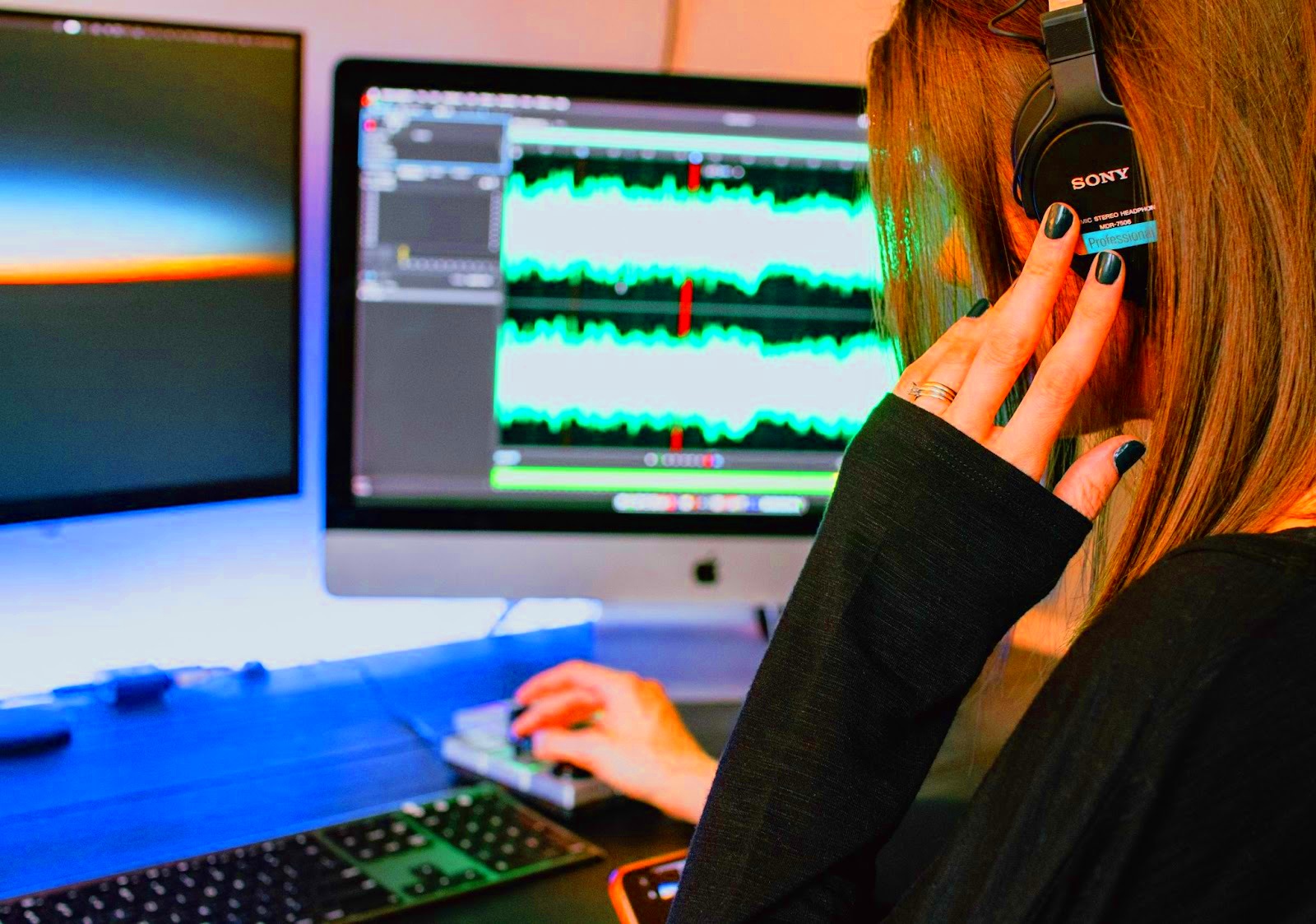An independent freelance audio engineer records, edits, mixes and produces sound for different projects. This can consist of music production, movies’ sound designing, podcast editing or live events’ audio setup. As a consequence of working according to the client’s specifications; freelance audio engineers are able to manage all parts of audio production making them multitalented individuals within the audio sector.
Freelancers usually have to handle different projects and clients at the same time unlike in-house audio engineers who focus on one project at a time. Therefore, they can be more flexible but need to manage time well. This is done by working with musicians, film directors, podcasters and other content creators in providing audio solutions that suit specific projects.
For example, some ordinary jobs consist of:
- Recording: Setting up microphones and other recording equipment to capture the highest quality sound.
- Editing: Cutting and refining audio clips for clarity and flow.
- Mixing: Balancing different sound elements to create a cohesive final product.
- Mastering: Finalizing the audio for distribution, ensuring it sounds professional across all platforms.
Skills You Need to Become a Freelance Audio Engineer

To become a proficient freelance sound engineer one needs both technical abilities as well as interpersonal traits. Some important competencies include:
- Technical Proficiency: Understanding audio software like Pro Tools, Logic Pro, and Ableton Live is essential. You should be able to use plug-ins, equalizers, compressors, and other tools to shape and refine sound.
- Creativity: Creativity is key for sound design and music production. It helps in crafting unique audio that fits the mood and feel of the project.
- Communication: You’ll need to clearly understand and execute the client’s vision, so good communication is crucial.
- Attention to Detail: Audio engineering requires precision, especially when editing or mixing tracks. Small changes can significantly impact the final output.
- Time Management: Freelancers handle multiple projects, so managing time and meeting deadlines is essential for client satisfaction.
Developing these skills will make you stand out, guarantee that the audio work you produce is at par with global standards hence making yourself reputable among freelancing practitioners.
Also Read This: How to Change Your Fiverr Profile Name
Setting Up Your Home Studio for Freelance Audio Engineering

Freelance sound engineers cannot do without a home studio; it gives them control and flexibility during production. One can even establish a professional-looking studio that is also cheap if they know the basics and have the right tools. Concentrate on these issues:
1. Room Acoustics: Choose a quiet space with minimal background noise. Invest in acoustic foam panels to reduce echoes and control sound reflections.
2. Essential Equipment: You don’t need top-of-the-line gear, but reliable equipment makes a difference. Consider these basics:
| Equipment | Purpose |
|---|---|
| Computer | For running audio software and plugins. |
| Digital Audio Workstation (DAW) | The software platform for recording and editing. |
| Audio Interface | Connects microphones and instruments to the computer. |
| Studio Monitors and Headphones | For accurate sound monitoring. |
| Microphones | Essential for recording vocals and instruments. |
3. Software: Invest in reliable DAWs like Pro Tools or Logic Pro and explore free plugins initially before expanding to paid options as your experience grows.
Although setting up a home studio may look like a task, beginning with these basic requirements will help you produce amazing sounds. For most music enthusiasts, having a good home studio is important since it enhances one’s work professionalism and can draw in many customers. (290 characters)
Also Read This: How to Get an Order from Fiverr: A Comprehensive Guide
How to Find Clients as a Freelance Audio Engineer
Client acquisition for up-and-coming freelance audio engineers can often seem daunting; but there is hope through perseverance in this quest. One must know how best then to keep themselves busy so as to ensure that they are able to bank something at the end of every month on account of it being constant and regular (as opposed to just working for one time period). It all begins with enlarging one’s social circle thereby turning towards cyberspace and other sites where one could exhibit their talents.
Some effective ways of finding clients include:
- Freelance Platforms: Websites like Fiverr, Upwork, and SoundBetter are dedicated to connecting audio professionals with clients. Create a strong profile and highlight your expertise to attract clients seeking audio services.
- Social Media: Platforms like Instagram, LinkedIn, and Facebook allow you to share your work and connect with potential clients. Post audio samples, client testimonials, and behind-the-scenes content to engage followers.
- Networking: Attend industry events, join audio engineering forums, and participate in online groups. Networking with musicians, producers, and filmmakers can lead to valuable connections and word-of-mouth referrals.
- Cold Outreach: Reach out directly to potential clients, such as podcasters, bands, and content creators, who might need audio services. Send a friendly, professional message with a sample of your work to show what you offer.
Using multiple strategies will expand your horizon and enhance your possibilities of obtaining clients. Over time, loyalty in showcasing your talents or remaining involved in critical societies will result in creating a robust client portfolio.
Also Read This: Payments to Freelancers by the New York Times
Creating a Strong Portfolio to Attract Clients
Resilience is being able to pick oneself up after a fall, the art of bouncing back. Never forget that life goes on in its course and humans are never programmed to stay in one place for too long. A strong portfolio can help showcase your skills and attract clients’. It’s an evidence of what you can do, it helps clients know if they will be able to work with you or not on the project at hand. Therefore, the best works must be highlighted within your portfolio to show off flexibility displayed during sound engineering activities.
How to create an amazing portfolio:
- Choose High-Quality Samples: Select pieces that showcase a range of skills, such as mixing, mastering, sound design, and editing. Each sample should reflect your professionalism and attention to detail.
- Show Diversity: Include projects from different genres and formats, like music tracks, podcasts, and film audio. This variety demonstrates that you can handle diverse audio needs.
- Add Brief Descriptions: For each sample, include a short description explaining your role in the project. Mention any specific techniques or tools you used to make your work stand out.
- Use an Online Platform: Showcase your portfolio on a professional website or platforms like SoundCloud and Behance, making it easy for potential clients to access and listen.
An appropriately structured portfolio creates an excellent impact, enabling you to emerge more conspicuously as a result of professionalism and admirable work which is often sought after by clients. Always incorporate recent assignments for your development and progressive dexterities.
Also Read This: Starting Freelancing Without Experience: What You Need to Know
Pricing Your Services as a Freelance Audio Engineer
When you are a freelance audio engineer, making a price tag for your own services will always require you to walk on a tightrope between competitiveness and fair remuneration for one’s professional skills. Setting precise, sensible rates may appeal to customers as well as making sure that the contractor is paid well for his/her work.
Take into account these items when you are establishing your charges:
- Project Type and Complexity: Rates may vary based on the project type—mixing and mastering a song, for instance, could be priced differently from sound design for a film. Consider the time and resources each type of project requires.
- Industry Standards: Research industry rates to understand the general price range for services. Platforms like Upwork and Fiverr can provide insight into what other audio engineers charge.
- Your Experience: If you’re starting out, you may offer slightly lower rates to attract clients. As you gain experience and build a portfolio, gradually increase your rates to reflect your expertise.
- Hourly vs. Project-Based Pricing: Decide whether to charge per hour or per project. Project-based pricing is often clearer for clients, while hourly rates may better suit long-term, ongoing work.
By having a pricing structure, clients will know what they are getting for their money and it would also bring about transparency. Do not hesitate to speak on rates with your clients so that both of you can agree on them.
Also Read This: Does Fiverr Take a Percentage of Tips?
Managing Projects and Deadlines Efficiently
A good audio engineer is a businessman who manages his own projects and deadlines to gain the trust of their clients. Projects do not belong to any person in particular; freelancers move from one project to another most of the time. Thus, to keep things running well and avoid missing out on anything, a freelancer has to be able to organize himself/herself.
Here are some tactics to maintain your position at the load of work:
- Use Project Management Tools: Tools like Trello, Asana, and Notion help you organize tasks, set deadlines, and track project progress. With these tools, you can set priorities, assign due dates, and avoid last-minute stress.
- Create a Realistic Schedule: Divide larger projects into smaller, manageable tasks with specific time allocations. Estimate how long each task will take and plan accordingly to avoid rushing at the end.
- Communicate with Clients: Keeping clients updated on project status helps manage their expectations. If any delays arise, promptly inform clients to maintain transparency and trust.
- Set Milestones: Break down projects into phases and set milestones for each one. Meeting smaller goals along the way keeps you motivated and ensures steady progress toward completion.
- Limit Distractions: Create a focused work environment to improve productivity. Consider setting specific work hours and taking breaks to maintain a balance between focus and rest.
If you apply these tactics then you will enhance your job performance, abide by the client’s timelines and also keep a good standing as an audio engineer that the bosses can rely on.
Also Read This: How to Cancel an Order on Fiverr: A Step-by-Step Guide
FAQs
Some commonly asked questions regarding a career as an independent sound technician include:
- How do I start as a freelance audio engineer?
Begin by building a portfolio, investing in basic equipment, and creating profiles on freelance platforms to find your first clients. - Do I need a formal degree to work as an audio engineer?
A degree can be helpful but is not essential. Many audio engineers are self-taught or have gained experience through internships and projects. - How can I price my services competitively?
Research industry rates and consider your experience level. Start with modest pricing if you’re new, and adjust as your skills and portfolio grow. - What equipment is essential for a home studio?
Basic requirements include a computer, audio interface, DAW software, studio monitors, headphones, and a microphone. - How can I keep up with industry trends?
Follow audio engineering blogs, participate in online forums, and take part in courses or webinars to stay updated on new techniques and technology.
Conclusion
Becoming an independent sound engineer is a motion that involves a lot of creativity, flexibility and autonomy. A successful freelance business can be established by acquiring the relevant skills, having an effective home studio and managing client expectations. In order to create long-term relationships with clients and earn a positive image in the industry, you should keep track of your things, update your portfolio regularly and communicate well.
It can be a satisfying and fulfilling career option when you begin to work as a freelance audio engineer, because experience increases your skills and you learn new techniques in the same line. You will eventually have clients who value you for your creativity and proficiency if you consistently produce high-quality work.




